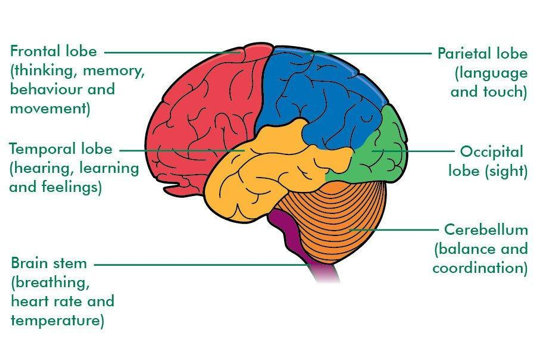How does a trial lawyer who understands concussions, head injuries and traumatic brain injuries take care of people who are hurt in car wrecks, falls or sports?
If you have hurt your head in a car accident or crash, a trip or slip and fall or a sports injury, you may be having many problems that you do not connect to your head injury. If you are have injured in any of these ways, a concussion or brain injury can cause any of the following symptoms:
- Headaches or feeling of pressure in the head
- Confusion or feeling as if in a fog
- Memory problems or amnesia about your accident
- Dizziness or if you see stars when you were hurt
- Ringing in the ears
- Nausea or vomiting
- Slurred speech
- Sensitivity to light or noise
- Appearing dazed
- Problems responding to questions
- Problems with word finding
- Irritability
- Fatigue
- Depression
Questions about how brain injuries cause these kind of symptoms are answered in this blog.

If you remember one thing, choosing to have your case handled from the beginning by an experienced trial lawyer who understands representing injury victims with head injuries increases your chance of getting justice.
Here are two examples of the results we secured for clients who asked for our help after they suffered a concussion:
Concussion or Traumatic Brain Injury While Playing Soccer
A soccer player reached out to CHASENBOSCOLO to help him deal with the complications of a concussion that occurred as a result of playing soccer. As a result of the player’s choice to hire an experienced trial lawyer who understands traumatic brain injuries, he received almost three quarters of a million dollars in benefits. More importantly, the player will receive all of the medical care he needs for his traumatic brain injury for the rest of his life.
Some people think a brain injury to a professional soccer player does not have much to do with the problems they experience from a concussion in a motor vehicle collision or a fall. Hearing the player’s story will help anyone who has a head injury understand: (1) the symptoms they can have; and (2) how the insurance company will behave.
Our client suffered a concussion when he was elbowed in the head. After the hit, our client experienced immediate symptoms included a loss of consciousness, dizziness and confusion. Over the course of the next two days he was dazed, confused and struggling to participate in the daily activities of life. However, like many folks who suffer traumatic brain injuries, he was in denial. Having grown up in a sports culture that encouraged him to “shake off” minor injuries like hitting his head, he did not think these symptoms prevented him from playing. More importantly, as a person who did not let anything stop him from accomplishing his goals, he was committed to not missing any games.
The player was cleared by the team’s orthopedic surgeon, not a doctor who generally takes care of head injuries, to return to play. Based on his desire to play soccer and the opinion of the doctor, the player chose to play in another game two days later. He will regret this decision for the rest of his life. He started the game despite having ongoing symptoms of the concussion two days earlier. During the game, he was hit in the head for a second time. This hit caused a dramatic worsening of his post-concussion symptoms.
Since suffering that concussion, our client never regained full brain function. For about a year, his employer gave him a front office job that simply required him to sit at a desk, use the computer and telephone and talk to people. Even these simple job duties proved to be too great for him. This former elite athlete was not able to answer the phone or use a computer due to the symptoms of his brain injury.
Even worse, his life’s plans were derailed. While playing soccer, he had formed a business running soccer camps and coaching youth soccer players as a way to both supplement his income and to begin planning for his post-career life. Before the injury, he was involved in all of the activities that go into running a business. He marketed the business, entered into contracts, coached players, made personal appearances and participated in the day-to-day operation of the business. Before his concussion, he had no problems balancing the e-mails, phone calls and meetings that were required to build and run his business with the demands of his work as a professional athlete. Multitasking was part of his daily life. After the traumatic brain injury, he tried to keep his business running. Although he could no longer participate in camps or coach kids, he tried to help by making personal appearance and performing administrative work for the business. The player did what he could to market, negotiate contracts and respond to daily e-mails. As time passed, he learned that he could not even do these simple activities that required virtually no physical activity. Looking at the computer screen for an extended period of time worsened his symptoms. Attempting to multitask worsened his symptoms. He had no choice but to give the business to his partner
As a result of these back-to-back concussions, the player is now unable to work in any meaningful way. While he can function as a husband and father for a few hours each day, these back-to-back concussions prevent this former professional athlete from engaging in the simple activities of daily living for more than a few hours at a time. He is now forced to spend most of his time in his home without much noise or light in an effort to prevent the worsening of his post-concussive symptoms.
The player’s health was gone and his ability to care for his family was in danger. He asked us to protect his family. We decided that the best way to do this was to file a workers’ compensation claim.
When we did, his former team denied that he had any ongoing symptoms as a result of the concussions he suffered. The claim was contested from beginning to end. The club contended that the player did not have a traumatic brain injury. The club accused him of exaggeration. The club said he was doing this just to get money. Since there is no test that can prove a person has a traumatic brain injury, the club used that fact to support its argument.
We presented his case to an Administrative Law Judge. To overcome the fact that there were no tests prove there is a brain injury, we presented the testimony of two neurologists and a neuropsychologist who had cared for the player.
While the Judge was considering the case, the club agreed to a settlement that will allow the player to protect himself and his family. The player’s medical expenses, which to date exceed $100,000.00, have all be paid by the workers compensation insurance company. The club will continue to pay for the medical care he needs for the rest of his life. Finally, as a result of our efforts, our client received in excess of $600,000 to make up the wages he lost as a result of the end of his career.
If insurance companies doubt that a highly motivated professional athlete actually suffers from traumatic brain injury, you can be sure that they will doubt all hard-working men and women who suffer with post-concussion symptoms. If you have suffered a head injury while working, talk to a trial lawyer who is knowledgeable about traumatic brain injuries. If you do so, he or she will fight for an outcome that protects you and your family
Concussion or Traumatic Brain in a Car Accident or Motor Vehicle Collision
If you suffer a concussion in a motor vehicle collision, you should talk with a trial lawyer who understands traumatic brain injuries. A lawyer with experience in representing people with head injuries will help you get the results that you deserve.
In 2013, a woman who was a community fixture in a Maryland suburb of the District of Columbia suffered a head injury in a wreck. She was a long-time employee of the community’s school system. At the time she was injured, she co-owned a toy store in the center of town. Prior to the motor vehicle collision, she was in perfect health and had an excellent memory. She was responsible for maintaining her toy store’s inventory. Her former business partner told us that she had a computer-like recall of toys the store had in stock and what each toy cost.
On the day of the injury, the woman was leaving the store’s parking lot. A traffic light controls the exit. The woman stopped at the traffic light and waited until it turned green. She looked to her left, her right and back to her left to be sure that traffic was stopped. When she was sure it was safe, she entered the intersection. A driver coming from her left in the left hand lane of traffic ran the red light and crashed into the driver’s side of the woman’s car. The airbags deployed. The woman was tossed from side to side hitting her head during the collision. She immediately developed a lump on her forehead and had cut on her head. She was dazed but did not lose consciousness.

In addition to injuring her head, she suffered injuries to her left shoulder, upper and lower back, and the left leg from the knee down.
At the emergency room, she denied she had lost consciousness. But, she could not remember anything between hearing a boom and realizing that someone was at her door asking her if she was all right. She has absolutely no recollection of the period of time right after the crash.
In the days, weeks and months that followed the collision, she had headaches, dizziness, balance issues and memory loss. Simple things like finding her keys or remembering what toys were out of stock escaped her mind.
Our client is a very tough person. She does not like or trust doctors.
Other than some treatment that was designed to try to improve her balance problems, our client chose not to get much medical care and treatment. When she was still experiencing memory loss, headaches, balance problems and dizziness, we sent her to see a top-notch neurologist. That neurologist determined that our client had a brain injury. He recommended neurological care. Our client chose not to get this care because it would only provide temporary relief and she does not like going to doctors. The neurologist concluded that our client lost 15% of the function of her brain.
Our client also was afraid to drive because she thought another irresponsible driver would ignore the traffic safety rules and hit her again. Our client was sure that she was going to be in another crash. Her driving anxiety is so bad that she never drives past the intersection where the collision happened. In order to help her overcome her fear we sent her to see a highly regarded psychiatrist. That doctor determined that our client suffered from depression and anxiety as a result the motor vehicle collision. He recommended psychological care. Our client chose not to get medical care because it would only provide temporary relief and she does not like going to doctors.
The insurance company, as they always do, based its evaluation of the case on the medical care and its costs. Since our client did not like doctors and did not get much medical care, her medical expenses were not very high. In the weeks and months leading up to trial, the insurance company offered only $57,000 for the life-changing traumatic brain injuries that our client suffered.
We decided that the case had to be presented to a jury. The case was tried for two days. The neurologist explained how the traumatic brain injury occurred and a friend, family member and former business partner all testified as to their observations of how the motor vehicle collision changed our client’s life.
After learning about traumatic brain injuries in general and how our client’s life was changed, the jury returned a $500,000 verdict.
This is why it is important to have a trial lawyer who is knowledgeable about traumatic brain injuries handle your personal injury or workers’ compensation case
The Most Important Thing to Remember
The simple truth is that concussions and traumatic brain injury are serious, life-changing injuries. Traumatic brain injuries are common in car wrecks, fall or sports injuries. Traumatic brain injuries are hard to understand and treat. It is very hard to prove that a person has a traumatic brain injury. Insurance companies and their lawyers know how to get their clients off the hook if you suffer a traumatic brain injury in a car wreck, fall or sports injury. If you want the results you deserve, you should talk with a trial lawyer who has actually tried cases involving traumatic brain injury.
CHASENBOSCOLO has more than twenty experienced trial lawyers waiting to help you, and we’re ready to help day or night.






